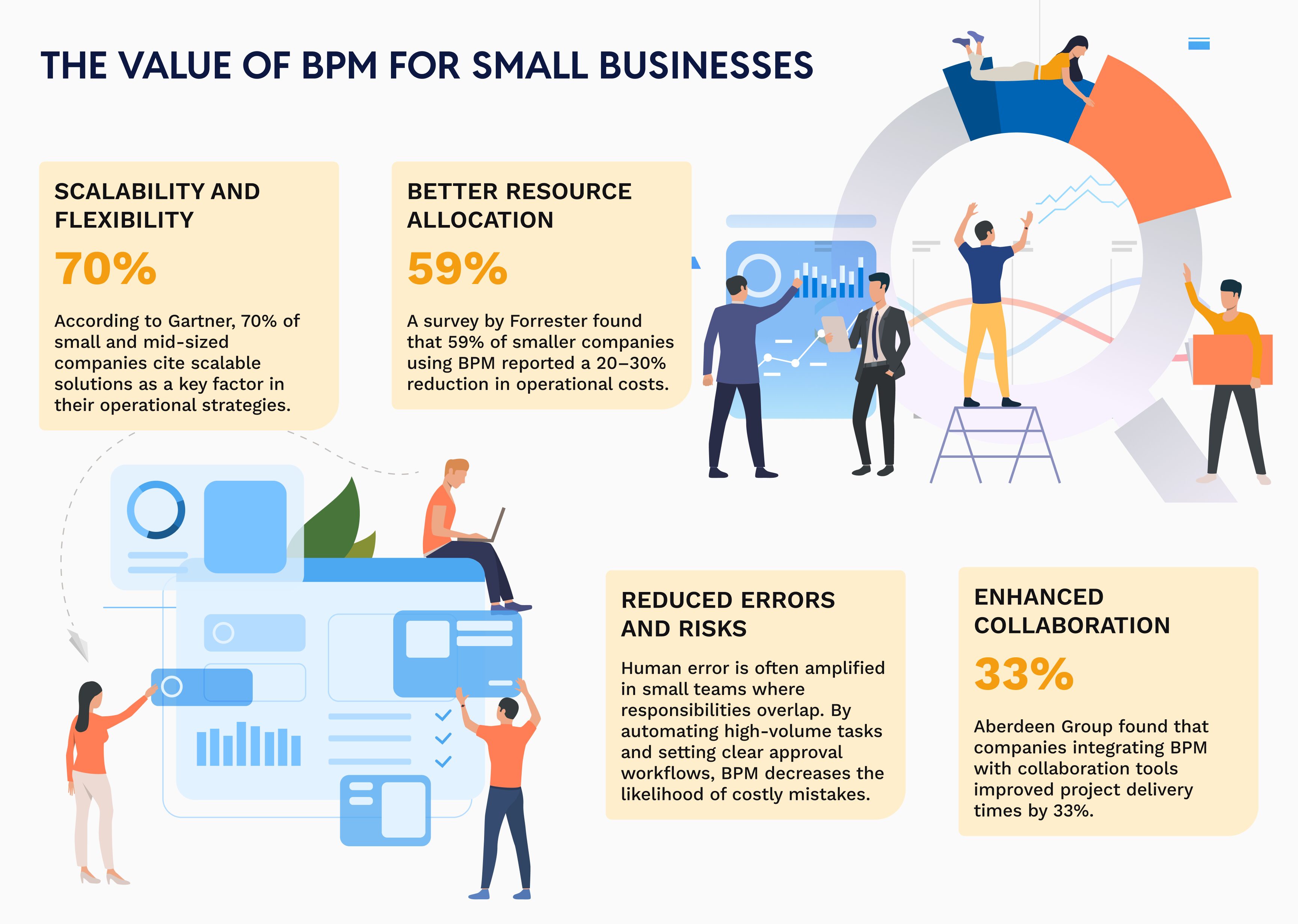When people think about Business Process Management (BPM), they often envision complex frameworks suited mainly for large corporations with sprawling operations. However, size doesn’t have to be a barrier to reaping the benefits of efficient, streamlined workflows. In today’s competitive market, small businesses and startups must be agile, adaptable, and cost-effective—qualities that align perfectly with BPM principles. In fact, 75% of organizations that implement BPM see notable improvements in efficiency and productivity, regardless of their size¹.
In this article, we’ll explore how smaller companies can benefit from BPM, share best practices for getting started, and show how XMC360 supports startups and SMEs in their journey toward operational excellence.


The Value of BPM for Small Businesses

Scalability and Flexibility
BPM tools are designed to grow alongside your company’s evolving needs. While larger organizations may tackle multi-departmental workflows, small businesses can start small—targeting the most critical processes first. According to Gartner, 70% of small and mid-sized companies cite scalable solutions as a key factor in their operational strategies². BPM’s modular approach allows companies to optimize workflows step by step without investing in massive, upfront infrastructure.
Better Resource Allocation
For startups and SMEs, every minute and dollar count. BPM frameworks help identify inefficiencies—like manual data entry or redundant steps—that consume valuable resources. A survey by Forrester found that 59% of smaller companies using BPM reported a 20–30% reduction in operational costs³. By reallocating resources from mundane tasks to strategic growth initiatives, small businesses can accelerate their path to profitability.

Reduced Errors and Risks
Human error is often amplified in small teams where responsibilities overlap. By automating high-volume tasks and setting clear approval workflows, BPM decreases the likelihood of costly mistakes. This disciplined approach ensures consistent quality in areas like invoicing, customer onboarding, and supply chain management—critical aspects that directly impact brand reputation.

Enhanced Collaboration
In many small businesses, employees wear multiple hats, which can cause confusion about who owns specific tasks. BPM clarifies responsibilities and standardizes handoffs, fostering a sense of accountability and teamwork. Aberdeen Group found that companies integrating BPM with collaboration tools improved project delivery times by 33%⁴.
BPM Best Practices for Startups and SMEs

Identify High-Impact Processes
Focus first on workflows that directly impact revenue or customer satisfaction. For instance, an e-commerce startup might optimize its order fulfillment process, while a consulting firm might refine its proposal-to-contract cycle.

Map Out Current Workflows
Create a detailed process map to pinpoint bottlenecks and redundancies. This visual assessment helps teams reach consensus on where to prioritize improvements.

Automate Where Possible
Once processes are refined, leverage automation tools to handle repetitive tasks like data entry or email follow-ups. Automation doesn’t just save time—it also frees employees to focus on creative, higher-value work.

Measure and Iterate
Establish key performance indicators (KPIs) such as turnaround time, error rates, and customer satisfaction. Regularly review these metrics to spot areas for further refinement.
How XMC360 Empowers Smaller Businesses
At XMC360, we specialize in delivering BPM solutions tailored to the unique challenges of startups and SMEs:
Scalable Architecture
Our platform can start with a single process module and grow as you add new teams, locations, or service lines.
User-Friendly Dashboards
Intuitive interfaces let you track process performance at a glance, enabling data-driven decisions without specialized IT support.
Automation & Integration
From customer support tickets to invoicing, XMC360 integrates with popular tools (e.g., CRM, accounting software) to ensure workflows connect seamlessly.
Real-Time Analytics
Identify bottlenecks or spikes in demand, then reallocate resources on the fly—critical for lean teams needing agility.

By aligning BPM principles with the nimble nature of small businesses, XMC360 helps you maximize efficiency, reduce costs, and focus on strategic growth opportunities.
Contrary to the popular belief that BPM is solely for large enterprises with complex operations, smaller businesses stand to gain just as much—if not more—from process optimization. By prioritizing critical workflows, automating tedious tasks, and maintaining a cycle of continuous improvement, startups and SMEs can achieve remarkable efficiency and cost savings.
At XMC360, we believe in empowering companies of all sizes to harness the power of BPM. Ready to elevate your operational efficiency without stretching your resources thin? Contact XMC360 today to discover how we can tailor BPM solutions for your startup or small business, setting the stage for sustainable growth.
References:
- “State of BPM Market” – Business Process Trends, 2022.
- Gartner. (2021). Scalable Solutions for SMEs Report.
- Forrester. (2020). Cost Savings Through BPM for SMBs.
- Aberdeen Group. (2019). Collaboration-Driven Efficiency in BPM.


